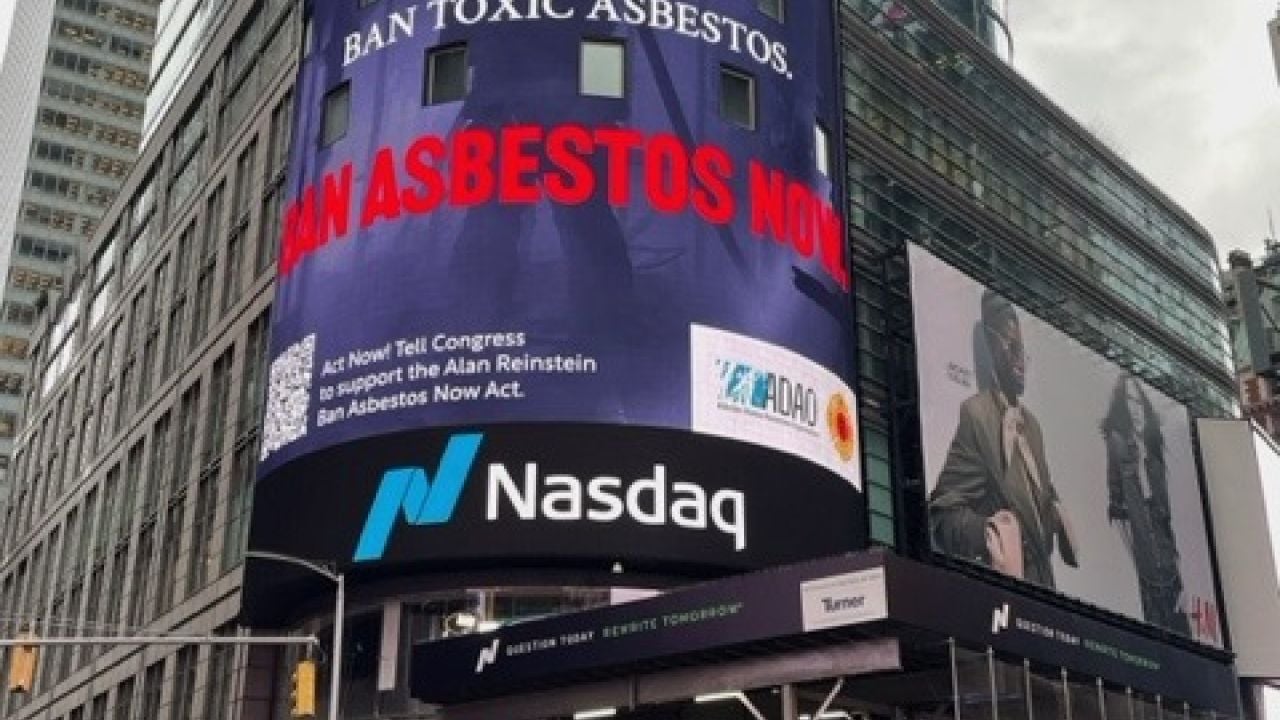
An unmissable new campaign featured on the iconic Nasdaq billboard in the heart of New York’s Times Square urges Congress to ban all uses and imports of cancer-causing asbestos.
“Ban asbestos now,” says the striking billboard, launched by the Asbestos Disease Awareness Organization, or ADAO, and the International Association of Fire Fighters, or IAFF. Featuring images of firefighters, who have greater exposure to asbestos and its risks, the billboard adds, “Firefighters face risk. They shouldn’t face cancer. Tell Congress: Ban toxic asbestos.”
Despite long-running calls to ban asbestos, some forms are still legal for use in the U.S. The two groups are shattering the common misconception that asbestos is no longer permitted in domestic manufacturing, amplifying its ongoing use and persistent, deadly threat to public health.
Although ADAO, EWG and others have warned about the deadly risks of asbestos for years, efforts to ban its use have stumbled. In 1989, the Environmental Protection Agency under President George H. W. Bush moved to prohibit it, but a pivotal 1991 federal appeals court ruling overturned the ban, keeping asbestos legal for chemical and manufacturing purposes.
Linda Reinstein, president and co-founder of ADAO, stressed the urgency of the situation in a New York Times article highlighting the new billboard. “We’re hoping to spark curiosity, and, by raising awareness, prevent exposure to asbestos,” she said.
Shockingly, over 300 tons of asbestos were imported into the U.S. in 2022 alone, perpetuating significant risks to public health from anyone exposed to it. With asbestos-related diseases claiming an estimated 40,000 lives annually throughout the country, Congress must act swiftly to impose a comprehensive ban.
IAFF General President Edward Kelly said firefighters face greater risk from asbestos, given their elevated exposure to it in their work. “Asbestos undoubtedly contributes to the heightened prevalence of lung diseases among firefighters, especially post-9/11,” he said.
Having Congress pass a nationwide ban on the import and use of asbestos would help protect the health and safety of first responders, Kelly added.
In 2016, Congress passed a law overhauling the Toxic Substances Control Act to strengthen the EPA’s regulation of toxic chemicals and other substances. The agency used this new authority to review the safety of asbestos and in April 2022 proposed a ban on U.S. companies’ use of chrysotile asbestos, the only known form of asbestos being imported.
Sen. Jeff Merkley (D-Ore.) and Rep. Suzanne Bonamici (D-Ore.) have sponsored legislation to prohibit all forms of asbestos. The ban would go further than the EPA proposal and address expected legal challenges.
The bipartisan bill is known as the Alan Reinstein Ban Asbestos Now, or ARBAN, Act and is named after Reinstein’s late husband, who died of asbestos-caused mesothelioma, in 2006. The legislation expands beyond mere restrictions on chrysotile asbestos imports, addressing all types of asbestos to combat the pervasive threat posed by legacy asbestos in existing infrastructure.
The ARBAN bill would go beyond the EPA proposal in three ways:
- Ban the importation and commercial use of all six asbestos variants, and the Libby amphibole asbestos.
- Mandate chlor-alkali plants that employ asbestos diaphragms to discontinue asbestos use and transition to non-asbestos technology within two years.
- Launch an educational outreach initiative aimed at ensuring full compliance by industries with the new asbestos prohibitions.
EWG last year offered support for the ARBAN bill, saying its provisions would help to eradicate cancer-causing asbestos. Diseases triggered by asbestos exposure have killed countless Americans and leave thousands of families grieving for the loss of loved ones every year.
The Times Square initiative stands as a powerful reminder of the relentless battle against this deadly substance, emphasizing the imperative to protect future generations from the devastating consequences of asbestos-related diseases and fatalities.
###



